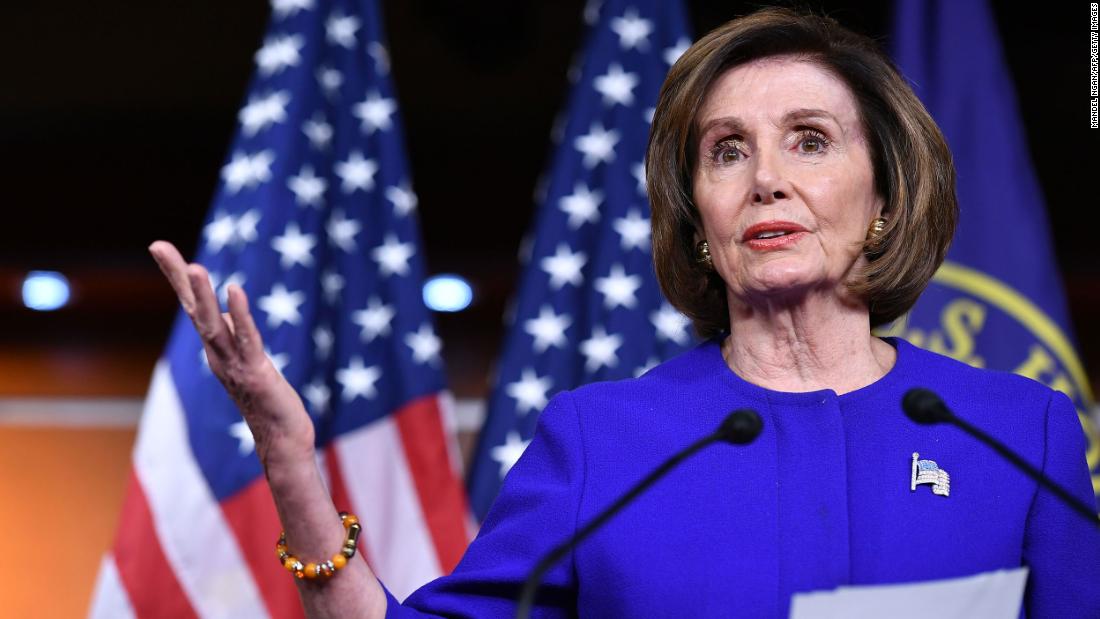You better believe Nancy Pelosi has a Bernie Sanders strategy - 4 minutes read
 (CNN) At her weekly news conference on Capitol Hill, House Speaker Nancy Pelosi was asked about the potential of Bernie Sanders as the Democratic nominee -- and his decidedly liberal agenda.
(CNN) At her weekly news conference on Capitol Hill, House Speaker Nancy Pelosi was asked about the potential of Bernie Sanders as the Democratic nominee -- and his decidedly liberal agenda."It is not unusual for a party platform or the candidates for president to have their own agenda that they would put forth. And it's not unusual for the House of Representatives to have its agenda, as well. We have to win in certain particular areas. We're not about a popular vote in the country or in particular states, in terms of your Electoral College. We are in district by district. And that's how we won last time we demonstrated that we know how to win."
In each episode of his weekly YouTube show, Chris Cillizza will delve a little deeper into the surreal world of politics. Click to subscribe!
Read between the lines and you get this: House Democrats will absolutely break with Sanders' expansive views on government involvement and spending, if doing so makes it more likely for them to keep their House majority.
Which really shouldn't be a surprise. We've already seen several House Democrats in competitive or GOP-leaning seats speak out publicly about their concerns with Sanders, a self-described democratic socialist, at the top of the ticket.
"South Carolinians don't want socialism," freshman Rep. Joe Cunningham of South Carolina told a local newspaper earlier this month . "We want to know how you are going to get things done and how you are going to pay for them. Bernie's proposals to raise taxes on almost everyone is not something the Lowcountry wants and not something I'd ever support."
Fellow freshman Democratic Rep. Dean Phillips of Minnesota told CNN's Manu Raju of Sanders : "There are probably 25-30 seats that absolutely would be impacted directly by having a self-avowed socialist at the top of the ticket. And I say that ... you know ... he's not a Democrat, you know, and that's something that I wish was better understood."
"We got a House to worry about. We got a Senate to worry about. If you want to keep the House in Democratic hands, you might want to check with the people who actually turned the House blue -- 40 Democrats who are not running on your platform. They are running away from your platform as fast as they possibly can."
"If you keep on going, we will elect Bernie. Bernie will lose to Donald Trump. And Donald Trump and the House and the Senate and some of the statehouses will all go red."
Now, it's worth noting here that for all the whispers and worries about what Sanders might do to down-ballot Democrats, there's very little evidence, at least yet, that nominating him would cause some sort of cataclysm for the party. In fact, one independent House handicapper recently moved his forecast in a more optimistic direction for Democrats
But what Pelosi is doing here is simply preserving the possibility that if a) Sanders is the nominee and b) it looks like his push for the elimination of private health insurance or for the Green New Deal is hurting House incumbents in swing seats, then she will have laid the groundwork to break with the nominee and go another way. It's not a "when" but rather more of an "if."
Here's the thing: House leaders (and the rank and file) always talk about distancing themselves from the unpopular opinions of their party or its presidential candidate. In 2018, plenty of Republicans said they would run on their own merits and not spend any time talking about Trump. Didn't work. In 2014, House Democrats sought to distance themselves from problems with President Barack Obama's Affordable Care Act. Didn't work. In 2010, House Democrats also had tried to distance themselves from the then-unopular Obama. Didn't work.
Why not, in all of those cases? Because the other party spent oodles of time linking members of Congress to the President of their party -- mostly on TV.
The reality is that the president or the party's presidential nominee is so all-encompassing as a political figure that it is very hard to distance yourself from them if you are a not-all-that-well-known member of Congress. That's been particularly true in our current political moment, where congressional elections have become much more tribal -- voting for the party as opposed to the person. It's harder and harder to get away from the swirling vortex of partisanship these days.
Pelosi, perhaps the preeminent political strategist of her generation, knows all of this. But she still wants to leave her members a bit of wiggle room. You know, just in case.
Source: CNN
Powered by NewsAPI.org